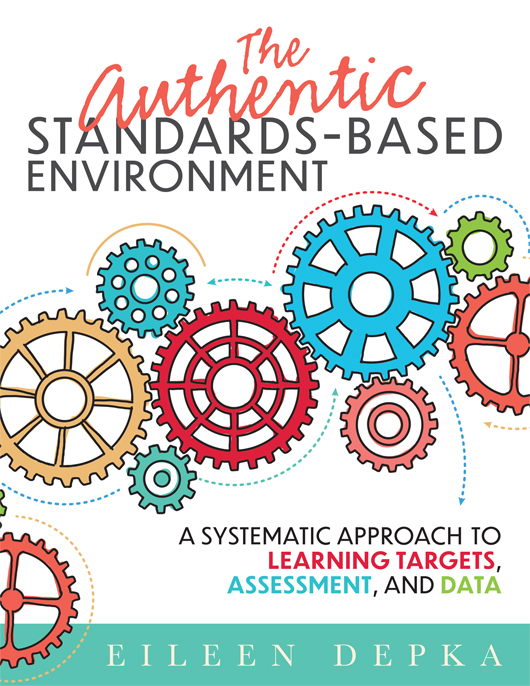Free Reproducibles
The Authentic Standards-Based Environment
A Systematic Approach to Learning Targets, Assessment, and Data
Implementing a true standards-based approach to teaching and learning can be complicated work. Author Eileen Depka breaks the process down into logical, doable steps that connect learning targets, rubrics, assessment, and data all back to standards.
Benefits
- Learn to unpack standards and understand the components and expectations rooted in them.
- Understand how to design standards-based learning targets that directly connect to each component of the standard.
- Design individual and common assessments that link with the rigor and expectations of the standard.
- Report data and design a scope and sequence that will guide next steps.
- Discover how to implement a standards-based system school- or districtwide.
Table of Contents
Part 1: The Foundation
Chapter 1: Unpacking Standards: Why and How
Chapter 2: Designing Standards-Based Learning Targets
Part 2: Tools and Analysis
Chapter 3: Creating Standards-Based Assessments
Chapter 4: Creating Standards-Based Rubrics
Chapter 5: Implementing Common Assessments to Ensure Comparable Data
Chapter 6: Using Unpacked Standards to Report Data and Create a Scope and Sequence
Part 3: Next Steps: Embedding the Process
Chapter 7: Implementing the Process School- or Districtwide
STUDY GUIDE
REPRODUCIBLES
Chapter 1
- Unpacked Standards Document
- Try It: Unpacked Standards Document Template for Reading—Literature Standard 2, Grade 2
Chapter 2
Chapter 3
Chapter 5
- Figure 5.5: Questions to Consider Prior to Implementing a Common Assessment
- Unpacked Standards Document for Vertical Teams
Chapter 6
Chapter 7
- Standards-Based Implementation Calendar, Version 1
- Standards-Based Implementation Calendar, Version 2
SUGGESTED RESOURCES
BOOKS
- Depka, E. (2017). Raising the rigor: Effective questioning strategies and techniques for the classroom. Bloomington, IN: Solution Tree Press.
- Depka, E. (2019). Letting data lead: How to design, analyze, and respond to classroom assessment. Bloomington, IN: Solution Tree Press.
- Eaker, R., & Marzano, R. J. (2020). Professional Learning Communities at Work and High Reliability Schools: Cultures of continuous learning. Bloomington, IN: Solution Tree Press.
- Erkens, C. (2015). Collaborative common assessments: Teamwork. Instruction. Results. Bloomington, IN: Solution Tree Press.
- Francis, E. M. (2022). Deconstructing Depth of Knowledge: A method and model for deeper teaching and learning. Bloomington, IN: Solution Tree Press.
- Guskey, T. R. (2015). On your mark: Challenging the conventions of grading and reporting. Bloomington, IN: Solution Tree Press.
- Guskey, T. R. (2020). Get set, go! Creating successful grading and reporting systems. Bloomington, IN: Solution Tree Press.
- Lipton, L., & Wellman, B. (2012). Got data? Now what? Creating and leading cultures of inquiry. Bloomington, IN: Solution Tree Press.
- Marzano, R. J. (2017). The new art and science of teaching. Bloomington, IN: Solution Tree Press.
- Marzano, R. J. (2018). Making classroom assessments reliable and valid. Bloomington, IN: Solution Tree Press.
- Marzano, R. J., Norford, J. S., & Ruyle, M. (2019). The new art and science of classroom assessment. Bloomington, IN: Solution Tree Press.
- Nichols, H. (2022). Finding your blind spots: Eight guiding principles for overcoming implicit bias in teaching. Bloomington, IN: Solution Tree Press.
- Schimmer, T. (2016). Grading from the inside out: Bringing accuracy to student assessment through a standards-based mindset. Bloomington, IN: Solution Tree Press.
WEBSITES

